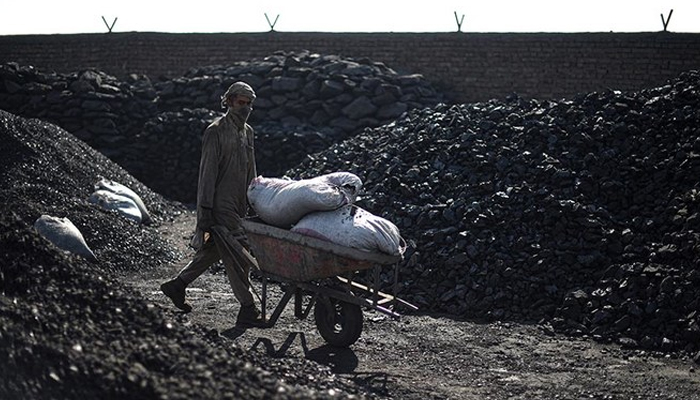Pakistan turns to sea-borne coal as Afghan high cost imports dry up
KARACHI - The coal consumption sector has shifted to imported coal from other countries, as the prices of coal from Afghanistan have soared in recent months, industry data showed on Monday.
The Pakistan International Bulk Terminal Limited (PIBTL) data showed a slowdown in coal imports from Afghanistan and a growth in imports from other sources. According to PIBTL's data, the terminal handled a record coal of around 493,000 tonnes in the first 16 days of January 2024, the highest half-month coal shipments in the last two years.
"The increase can be mainly attributed to the slowdown in Afghan imports and lower Richard Bay coal prices, which were nearly $98 per tonne during January 2024, as compared to $116 per tonne during the second quarter of this fiscal," said report by brokerage Sherman Securities.
PIBTL handled around 1.9 million tonnes of coal during the first half of this fiscal year, while it is estimated that the company handled around 1.8 million tonnes during the second quarter. The report attributed the rising trend to the cheaper imported coal, along with the appreciation of the rupee against the dollar. PIBTL charges around Rs2,000 per tonne for coal unloading at Port Qasim, while upcountry coal transportation via trucks costs around Rs 6,500-7,000 per tonne.
"We believe that imported Richard Bay coal costs around Rs40,000-41,000, while Afghan coal is trading between Rs 50,000-52,000, up 25 percent versus Richard Bay. This price difference will lend more support to imported coal, potentially increasing the coal handling of PIBTL," the brokerage said.
Currently, it is estimated that 70 percent of the coal demand for cement companies is being met through sea-borne coal via PIBTL, after the recent border issue with Afghanistan, which disrupted the land route for coal trade.
PIBTL's handling margin, after paying port charges and other allied costs, is around $4 per tonne on every single cargo it handles. Currently, due to the higher price of Afghan coal and
trade curbs, the majority of imported coal for cement plants is being handled by PIBTL.
During the first quarter of FY24, the company posted a net profit of Rs580 million, as compared to a loss of Rs440 million in the same period last year. The gross margin remained at 40 percent during the first quarter, as compared to 28 percent in the same period last year. "We believe the company will post an earnings per share of Rs1.5 in FY24, on the back of rising coal handling and lower exchange losses," the brokerage house said.
-
 King Charles Quietly Considering 'dramatic, Deeply Personal' Move For Meghan Markle, Prince Harry
King Charles Quietly Considering 'dramatic, Deeply Personal' Move For Meghan Markle, Prince Harry -
 Ethiopia Declares Itself Marburg Virus Free
Ethiopia Declares Itself Marburg Virus Free -
 Cristin Milioti Shares Disappointing Update About 'Penguin' Season 2
Cristin Milioti Shares Disappointing Update About 'Penguin' Season 2 -
 King Charles Makes Unreasonable Demand Of Kate Middleton In Shock Move
King Charles Makes Unreasonable Demand Of Kate Middleton In Shock Move -
 Princess Kate Shows 'unique Superpower' With Major Health Update
Princess Kate Shows 'unique Superpower' With Major Health Update -
 Indonesia: Search Operation Continues After Landslide Kills At Least 30, Leaving 100 Missing
Indonesia: Search Operation Continues After Landslide Kills At Least 30, Leaving 100 Missing -
 Ariana Grande, Cynthia Erivo Given Scathing Review By Oscars Voter
Ariana Grande, Cynthia Erivo Given Scathing Review By Oscars Voter -
 Royal Experts React As Meghan Markle Faces Major Hollywood Blow
Royal Experts React As Meghan Markle Faces Major Hollywood Blow -
 ‘Canada Trade Deal Isn't Zero-sum Game’: China Responds After US Tariff Threat
‘Canada Trade Deal Isn't Zero-sum Game’: China Responds After US Tariff Threat -
 Maren Morris Teases Musical Collab With Ex Ryan Hurd 2 Years After Split
Maren Morris Teases Musical Collab With Ex Ryan Hurd 2 Years After Split -
 Plastic Surgeon Reveals Skincare That Will Make You ‘three To Five Years’ Younger
Plastic Surgeon Reveals Skincare That Will Make You ‘three To Five Years’ Younger -
 Prince Harry Holding Tight To Past Bitterness As William Moves Forward
Prince Harry Holding Tight To Past Bitterness As William Moves Forward -
 US, South Korea To Expand Nuclear Submarine Cooperation Amid Regional Tensions
US, South Korea To Expand Nuclear Submarine Cooperation Amid Regional Tensions -
 Paris Hilton Compares Mental Health Illness To ‘a Demon In Your Mind’
Paris Hilton Compares Mental Health Illness To ‘a Demon In Your Mind’ -
 Gold Tops First-ever $5000 Mark: Inside Key Drivers & What Comes Next
Gold Tops First-ever $5000 Mark: Inside Key Drivers & What Comes Next -
 Expert Reveals If You Really Need Your Daily Supplements
Expert Reveals If You Really Need Your Daily Supplements




